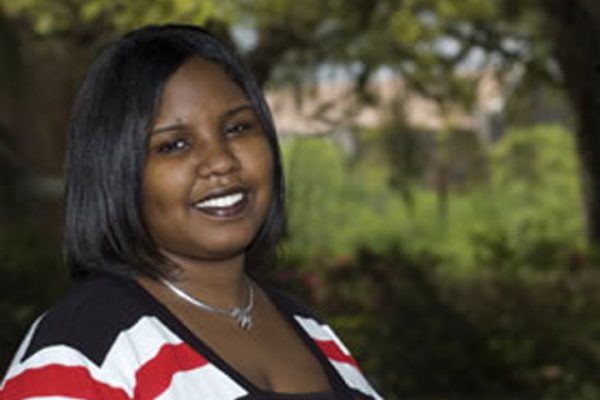
“Research-based programs that target particular groups and issues could help to increase academic motivation for disadvantaged students, thereby curbing a cycle of lower socioeconomic status and educational levels across generations.”
“As an alumni, student, and staff member,” says Shiffany Broughton, an HR Specialist in Florida State’s Office of Human Resources, as well as a master’s student in the Department of Educational Psychology, “I impact the University community on a daily basis. Working here has given me insight into a side of the collegiate world that most students do not have.”
She says, “I am a people person. I wanted to major in something that could benefit others.” Consequently, she studied Psychology, recently earning her bachelor’s degree. Not satisfied, she has continued her education, narrowing her focus. “Young people should have more of a support system. The Learning and Cognition program within Educational Psychology really spoke to my interests—using research and theory to understand different educational constructs, such as learner motivation, academic achievement trends, teacher motivation, and pre-service teacher instruction.” She has maintained a 3.9 GPA, while working full-time.
Both Psychology and Educational Psychology are helping her in her current technical and highly responsible position. “I work with all levels of personnel on campus and have had to use all of my educational tools to complete day-to-day responsibilities.”
Currently, she is putting together her thesis—”Does Parenting Style Influence Academic Motivation in Adolescents?”—where she considers whether parenting style, race, gender, finances, or ethnic background affect a teenager’s motivation to excel academically. For this is where Shiffany’s passion lies.
Despite great achievements in the past few decades, she says, “A gap in academic achievement still exists between majority and minority ethnic groups, as well as across socioeconomic levels. Research-based programs that target particular groups and issues could help to increase academic motivation for disadvantaged students, thereby curbing a cycle of lower socioeconomic status and educational levels across generations. Also, there has been an increase in single parent families, which has created a need for more after-school programs.”
“I felt,” says this woman who possesses a strong desire to connect with and help people, “that by opening a research-based community center I can use current research to do my part in helping future generations.”




